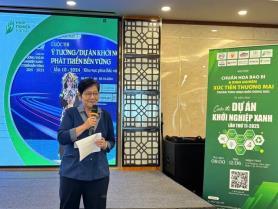Legal experts and fintech firms discuss the central bank's draft regulation that would limit the foreign ownership rate in the payment intermediary service sector to 49 per cent .

A draft regulation put forward by the State Bank of Viet Nam (SBV) that would limit the foreign ownership rate in the payment intermediary service sector to 49 per cent was discussed at a workshop in Ha Noi on Thursday.
Legal experts, fintech and e-payment firms attended the workshop held by the Viet Nam Chambers of Commerce and Industry (VCCI).
The draft decree includes new policies on the legal synchronisation of cryptocurrencies, managing cross-border payment activities, providing non-account payment services, payment management, perfecting regulations for payment intermediary services, and foreign investment in payment intermediaries.
Article 29 sets out the maximum percentage foreign investors can hold, including direct and indirect ownership, at 49 per cent of charter capital of an intermediary payment service provider licensed by the State Bank.
This article drew the most comments from participants.
Nguyen Thanh Hung, chairman of the Viet Nam E-commerce Association, said: “Although e-commerce has developed rapidly, the rate of non-cash payments has not increased as much as it should.”
“Foreign investment plays an important role in developing non-cash payments in Viet Nam, as it is a risky industry that many domestic firms are not ready for,” he added.
Nishikawa Shinichiro, representing Japanese investors and a director at Payoo e-wallet, said: “Foreign investors have made a great contribution not only in terms of investment but also in technology and know-how for the development of e-payments in the country,” while asking the SBV to reconsider the limit.
Deputy General Secretary of the Viet Nam Association of Financial Investors Phung Anh Tuan said payment intermediaries accounted for 90 per cent of local fintech activities and value, adding that: “Limiting investment will affect the whole fintech market.”
A representative from VNPT Epay SJC, an enterprise funded by 70 per cent of foreign investment, said: “Fintech in Viet Nam was in the development stages and was attracting lots of foreign investment. The ownership limit could create fear among foreign investors.”
Legal concerns
Legal experts also said the limit could violate commitments to the World Trade Organisation (WTO) and Comprehensive and Progressive Agreement for Trans-Pacific Partnership (CPTPP).
The retroactive provisions in Article 42 were contrary to Article 74 of the Investment Law, and contrary to commitments to protect investment in bilateral and multilateral trade agreements, which may lead to risks that the Vietnamese Government could be sued by foreign investors.
Dang Thanh Son, associate lawyer at Baker McKenzie Law Firm, cited the case of China being sued by the WTO when applying similar restrictions in the field of electronic payments.
Yee Chung Seck, a representative of the Singapore Business Association, said that though the restriction on fintech in Indonesia was not that big, it was enough to divert foreign investment flows from the industry.
Seck said Viet Nam should avoid this scenario, especially after the Government had committed to promoting Industry 4.0 and encouraging the development of a digital economy.
Virginia Foote, a representative of the American Chamber of Commerce in Viet Nam (AmCham Vietnam) and co-chair of the Viet Nam Business Forum (VBF), suggested the drafting board should reconsider the issue due to the influence it would have on investor confidence in the country.
On behalf of the drafting board, Deputy Director of the SBV Payment Department Le Anh Dung said: “The limit is a reasonable ratio in line with international commitments, ensuring the interests of all parties, and serving the sovereignty and rights of Viet Nam in the payment industry."
However, he also said the SBV appreciated all the comments, adding that the board would take them into consideration. — VNS





